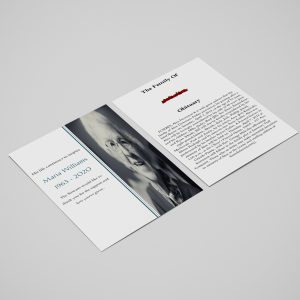Funeral services mark a deeply emotional time for families, friends, and loved ones. During these difficult moments, the support received from others can be a source of great comfort. After the funeral, it’s a tradition to send out Sympathy Thank You Cards to express gratitude to those who have been there during the loss of a loved one. These cards are more than just a courtesy; they provide an opportunity to acknowledge the kindness shown through visits, meals, flowers, donations, or comforting words.
Why Sympathy Thank You Cards Matter
After a funeral, the outpouring of love and support can be overwhelming. Friends and family members come together to offer condolences, assist with the service, and provide practical help in many ways. Sending a sympathy thank you card is a way to acknowledge their efforts and express appreciation for the kindness they have extended.
Importance of Sympathy Thank You Cards
- Acknowledges Support: Sympathy thank you cards give you the opportunity to thank those who helped you through one of life’s most difficult moments. It recognizes the emotional, physical, and financial support provided.
- Personal Connection: These cards are a personal gesture that can bring comfort to those who have offered condolences and help. It’s a small but powerful way to stay connected with your community during a time of loss.
- Closure: Sending thank you cards may also bring a sense of closure for the grieving family, helping them process their feelings and move forward in the healing process.
- Tradition and Etiquette: Many cultures emphasize the importance of showing appreciation after a loss, and thank you cards are part of funeral etiquette in many traditions. It’s a thoughtful way to acknowledge those who have shared in your grief.
What to Include in Sympathy Thank You Cards
Crafting a heartfelt message for a sympathy thank you card can seem daunting when you are grieving. However, it doesn’t have to be elaborate. A sincere message of gratitude can be simple and brief. Here are key components to consider:
1. Start with a Salutation
Begin with a friendly greeting, addressing the recipient by name if possible. A personalized salutation makes the message feel more genuine and intimate.
- Examples:
- “Dear [Name],”
- “To our dear friend [Name],”
2. Express Your Gratitude
Thank the recipient for their specific support. If they brought food, sent flowers, or made a donation in memory of the deceased, mention that. Recognizing the individual acts of kindness helps convey your appreciation.
- Examples:
- “Thank you so much for the beautiful flowers you sent for [Deceased’s Name]’s service.”
- “We truly appreciate the meal you brought over. It was a great comfort to us during this difficult time.”
3. Mention the Impact of Their Support
Share how their gesture made you feel or how it helped you cope with your grief. This adds a personal touch to the message.
- Examples:
- “Your presence at the service meant the world to us.”
- “The donation you made in [Deceased’s Name]’s memory touched us deeply.”
4. Close with Warmth
End your card with a closing that feels right for the level of closeness you have with the recipient. You can use a simple phrase like “With love,” or “With sincere thanks,” followed by your name or your family’s name.
- Examples:
- “With heartfelt thanks, The [Family Name].”
- “In gratitude, [Your Name].”
Personalizing Sympathy Thank You Cards
Each sympathy thank you card can be tailored to the recipient’s relationship with the deceased or the nature of their support. Personalization adds depth to your message and shows that you noticed and valued their specific kindness.
1. For Those Who Gave Gifts
- Message: “Thank you for your generous donation in memory of [Deceased’s Name]. It was incredibly thoughtful and has helped us honor [his/her] memory in a meaningful way.”
2. For Those Who Attended the Service
- Message: “Thank you for attending [Deceased’s Name]’s service. Your presence brought us comfort, and we appreciate your support during this difficult time.”
3. For Close Friends and Family
- Message: “Your love and support throughout this time has meant everything to us. We are so grateful for your friendship and care.”
4. For Professional Help
If you want to thank the clergy, funeral home staff, or any other professional involved in the service, keep the message simple but appreciative.
- Message: “Thank you for the care and guidance you provided during [Deceased’s Name]’s funeral. Your support was invaluable in helping us through such a difficult day.”
Tips for Writing Sympathy Thank You Cards
Writing several thank you cards after a funeral can feel overwhelming, but the process can be manageable with some practical tips:
1. Don’t Rush
There is no set timeline for sending out sympathy thank you cards. While it is considered proper etiquette to send them within two to three weeks of the funeral, it’s perfectly acceptable to take longer, especially if you are feeling emotionally drained.
2. Use a Template
If you are writing a large number of cards, creating a basic template can help streamline the process. You can personalize each card by adding a sentence or two about the recipient’s specific contribution.
3. Enlist Help
If the thought of writing thank you cards is too overwhelming, don’t hesitate to ask for help. Close family members or friends can assist with addressing envelopes, writing cards, or even coming up with wording ideas.
4. Keep It Simple
Remember, your cards don’t need to be long or overly detailed. A few heartfelt sentences can convey your appreciation just as effectively as a longer message.
Sympathy Thank You Card Etiquette
Sympathy thank you cards are not mandatory but are seen as a thoughtful and gracious gesture. Here are some general etiquette guidelines to follow:
1. Who Should Receive a Thank You Card?
You should consider sending thank you cards to anyone who:
- Sent flowers, a donation, or a gift.
- Offered meals or other forms of assistance.
- Attended the funeral or service.
- Provided support during your time of grief (such as clergy or caregivers).
2. When to Send the Cards?
While there’s no hard deadline, thank you cards are typically sent within two to three weeks following the service. If you need more time, that’s perfectly acceptable – grieving takes time, and no one expects you to rush through the process.
3. Who Should Sign the Cards?
Sympathy thank you cards can be signed by the person closest to the deceased, or they can be signed as a family (e.g., “The Smith Family”). If multiple people are contributing, it’s fine to distribute the writing tasks among family members.
Funeral Thank You Card Templates
-
Searching for a Simple Funeral Thank You Card Template that is easy to print and amass and that has a cutting-edge look? This Simple Funeral Thank You Card Template is the Perfect decision that is having a measure of 8.5”x 5.5”.
- No Limitation on Content, Edit anything
- Edit anytime – unlimited revisions even after purchased
- Get printable PDF downloaded to get it printed your own.
-
Searching for a Green Leaf Thank You Card template that is easy to print and amass and that has a cutting-edge look? This Green Leaf Thank You Card Template is the Perfect decision that is having a measure of 5.5”x 8.5”.
- No Limitation on Content, Edit anything
- Edit anytime – unlimited revisions even after purchased
- Get printable PDF downloaded to get it printed your own.
-
Searching for a Natural Thank You Card Template that is easy to print and amass and that has a cutting-edge look? This Natural Thank You Card Template is the Perfect decision that is having a measure of 5.5”x 8.5”.
- No Limitation on Content, Edit anything
- Edit anytime – unlimited revisions even after purchased
- Get printable PDF downloaded to get it printed your own.
-
Searching for a Pink Rose Thank You Card Template that is easy to print and amass and that has a cutting-edge look? This Pink Rose Thank You Card Template is the Perfect decision that is having a measure of 5.5”x 8.5”.
- No Limitation on Content, Edit anything
- Edit anytime – unlimited revisions even after purchased
- Get printable PDF downloaded to get it printed your own.
-
Searching for a Autumn Thank You Card Template that is easy to print and amass and that has a cutting-edge look? This Autumn Thank You Card Template is the Perfect decision that is having a measure of 5.5”x 8.5”.
- No Limitation on Content, Edit anything
- Edit anytime – unlimited revisions even after purchased
- Get printable PDF downloaded to get it printed your own.
-
Searching for a Floral Thank You Card Template that is easy to print and amass and that has a cutting-edge look? This Floral Thank You Card Template is the Perfect decision that is having a measure of 5.5”x 8.5”.
- No Limitation on Content, Edit anything
- Edit anytime – unlimited revisions even after purchased
- Get printable PDF downloaded to get it printed your own.
-
Searching for a Irish Green Thank You Card Template that is easy to print and amass and that has a cutting-edge look? This Irish Green Thank You Card Template is the Perfect decision that is having a measure of 5.5”x 8.5”.
- No Limitation on Content, Edit anything
- Edit anytime – unlimited revisions even after purchased
- Get printable PDF downloaded to get it printed your own.
Funeral Programs : Helping Videos
Frequently Asked Question On Sympathy Thank You Cards for Funerals
Do I have to send a thank you card to everyone who attended the funeral?
No, you are not expected to send thank you cards to every attendee. Focus on sending cards to those who provided specific support, such as sending flowers, meals, or donations.
Can I send digital sympathy thank you cards?
While traditional printed cards are the most common, sending a digital thank you card via email is acceptable, especially for long-distance recipients or those who provided digital support.
What should I do if I forget to send a card?
It’s never too late to send a thank you card. If you realize later that you forgot someone, it’s perfectly fine to send a card even weeks or months after the funeral.
How long should a sympathy thank you card message be?
Sympathy thank you card messages can be brief, typically 2-3 sentences. A simple, heartfelt message expressing your gratitude for the recipient’s support or contribution is sufficient. There’s no need to write long or elaborate notes during such an emotional time.
Is it okay to send pre-printed sympathy thank you cards?
Yes, pre-printed sympathy thank you cards are perfectly acceptable. You can choose cards that come with a printed message and add a personal touch by including the recipient’s name and a short handwritten note of appreciation.








